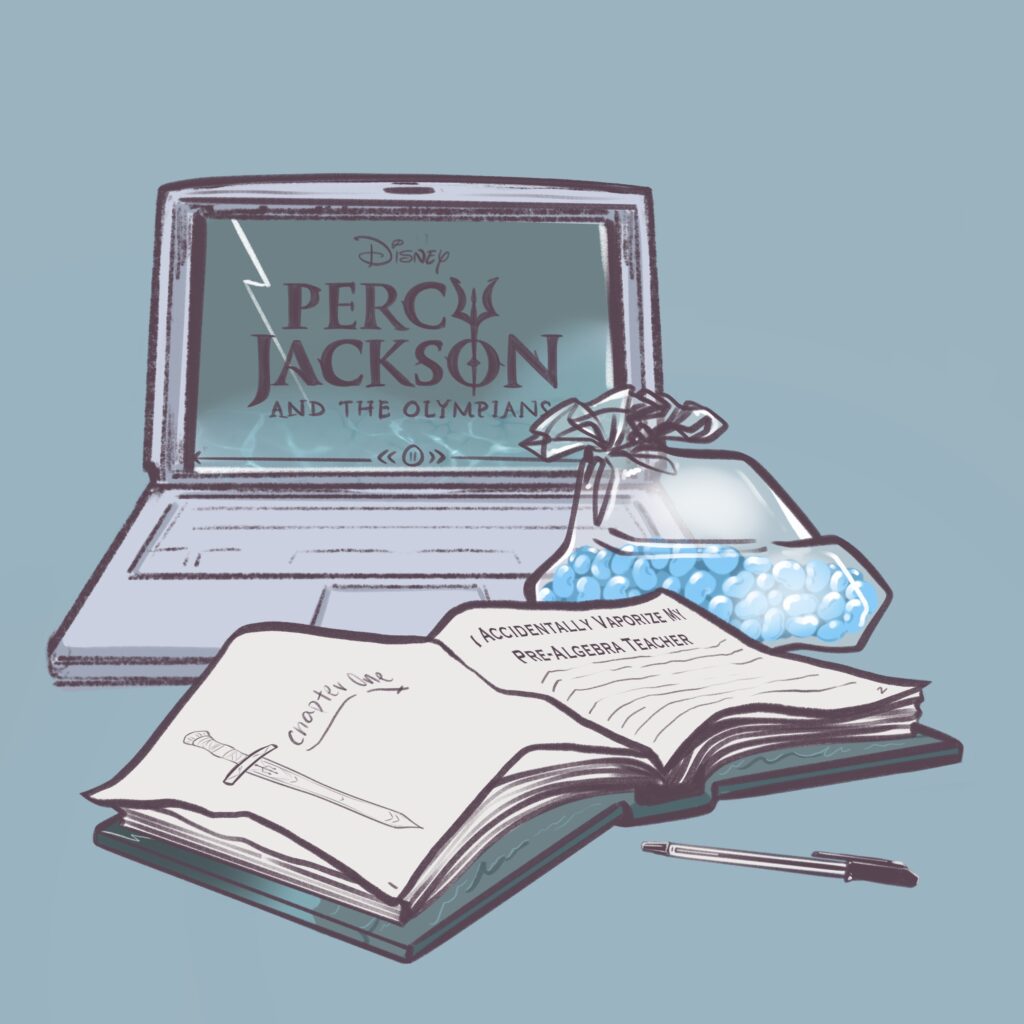Aviva Vic Maxon ’24
Staff Writer
I read the Percy Jackson and the Olympians series when I was about 12, and I, like many others, found comfort in the stories and the moral choices that were both clear and contended. The acceptance of learning disabilities and the idea that a kid could change the world made me feel at home at Camp Half-Blood. Beginning with the original five books, the Heroes of Olympus series, Trials of Apollo, and their other stories in the Riordan-verse, Percy, Annabeth, and their friends have had a considerable influence on me growing up and building my values. I wanted to be confident like Percy, thoughtful like Annabeth, courageous like Clarisse, and kind like Grover.
The 2010 and 2013 film adaptations of the first two novels, The Lightning Thief and Sea of Monsters, let readers down by taking away the heart of why the stories are so popular. Straying from the source material, aging up the cast, lackluster special effects, and an unconvincing script all spelled doom for those movies, to the point that many in the fandom ignore their existence entirely. When creating the show, Disney was wise to take the critiques of the 2010 and 2013 movies as a strong indication for what fans, new and old, really wanted from a Percy Jackson show.
The show succeeded in many ways, most notably in casting, technical design, and authenticity. Casting was done with intention, finding actors who could truly embody the characters. Additionally, Walker Scobell, Leah Sava Jeffries, and Aryan Simhadri as the main trio, Percy Jackson, Annabeth Chase, and Grover Underwood respectively, were a testament to the importance of age in this story.
Jeffries particularly stood out; her performance was deep and found the heart of what it means to be a daughter of Athena, even after facing racist backlash online for her casting. By keeping the main cast of campers around 12 years old like the book series, the show reminded audiences to project into what it means to be a child going on dangerous adventures. The trio also have great chemistry and are talented, despite their youth.
Jason Mantzoukas as Dionysis also exemplified their successful casting. The actor known for playing unhinged and chaotic characters was the perfect choice for Camp Director ‘Mr. D.’ Mantzoukas brought an air of nonchalance and unpredictability that stayed true both to the character and the mythical deity.
The show also excelled in technical design. From utilizing real locations, and combining practical and CGI effects, the show suspended reality and brought the magic — and mythical — to life. During filming, actor Glynn Turman, portraying Chiron the centaur, rode a horse, which was advantageous during post-production when CGI technology made him half man, half horse.
The special effects and fight scenes were also incredibly well done. All of the effects were smooth and believable in a way that enhanced the story and furthered the suspension of disbelief. The audience felt immersed in the demigods’ quest, walking the blurred line between the mythical and mortal worlds.
There are moments in the show where the writing is not as strong as the other elements. Some elements of the story were changed from the source material, and fans did not get the time at camp they were expecting. Much of Grover’s character was also a point of contention, as he seemed sanitized and was relegated to a plot device rather than the best friend to Percy and Annabeth. The character is meant to bridge the gap between the two strong-willed demigods, but ends up being there mostly just for show. Grover lacks his notable goofiness and confusion.
Additionally, the story brought in Kronos much earlier and much broader than in the original text. It seemed like too many characters knew too much too soon. The stakes were changed. Percy knowing that his quest was about more than the master bolt made the stakes, which were already high, higher. From the beginning Percy is seen as this great demigod, instead of him having to work and earn that position. While many of these critics are valid, they also still point to the actual heart of why we love Percy Jackson so much.
The show caters to an authenticity that is not often seen on screen. The form of storytelling, the actors, sets, and emotion in the show truly draw in viewers. Though I know the story well, having read the source material many times both as a child and adult, I spent much of the show on the edge of my seat waiting to see what happened next. The performances felt real, the stakes felt real, and the messages resonated.
While I might not have a mythical family, or be sent on quests, I could still relate to the family struggles, the search for belonging, and grappling with right from wrong that the characters go through in this season. In keeping to the source material, Percy Jackson and the Olympians brought back a younger wonder, hope, and possibility. If Percy, Annabeth, and Grover can fight these mythical monsters and live, we can fight the real-world monsters.
Image Source: Kinsey Ho ‘27



